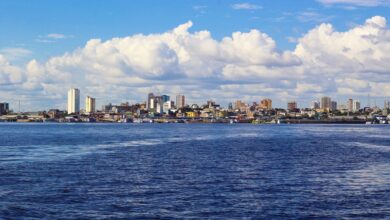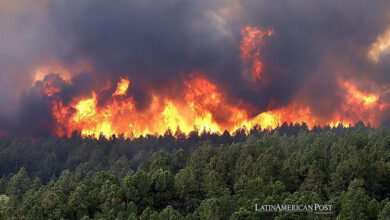Oil and gas production must end by 2050 according to experts
According to a report from the University of Manchester, rich countries must end oil and gas production by 2034 to limit global warming to 1.5 degrees Celsius .

Photo: Unsplash
LatinAmerican Post | María Fernanda Ramírez Ramos
Listen to this article
Leer en español: La producción de petróleo y gas debe acabar para 2050 según expertos
New research, by climate change experts Dan Calverley and Kevin Anderson, from the Tyndall Center at the University of Manchester, conducted an analysis of phase-out pathways for fossil fuel (oil and gas) production to meet the requirements. of the Paris Agreement.
To "keep 1.5 alive" US, Norway, UK & other wealthy oil & gas producers must stop production by 2034. Poorest producers have until 2050. New report https://t.co/mxQUICJjZi But all nations need to begin phaseout now. 1.5°C means no more fudges, lies & scams; i.e. no new production!
— Kevin Anderson (@KevinClimate) March 22, 2022
The 2015 Paris Agreement is an international treaty on climate change that is legally binding for the 197 countries that signed it. In it, the states commit to keep the global average temperature increase below 2 degrees Celsius and to make efforts to limit the increase in said temperature to 1.5 degrees Celsius. However, due to the effects of greenhouse gases, the outlook has not been very encouraging.
The University of Manchester study points out that if the Paris goals are to be met, there is no chance that a nation will increase oil and gas production. Instead, everyone must commit to making significant cuts, in less than a decade. In this sense, taking into account the levels of development and wealth, and the economic dependence of countries on fossil fuels, the report indicates that the richest countries must reduce production by 74% by 2030 and put an end to it by 2034. This list includes 19 countries, including the United States, the United Kingdom, Norway, Canada, Australia, and the United Arab Emirates.
Although there had already been talk of the need to eliminate the use of coal as an urgent measure to curb climate change, plans to replace oil and gas had not been the protagonists. However, Russia's recent invasion of Ukraine has also highlighted the need for European nations not to rely on Russian gas. Therefore, green alternatives are, in addition to an option, an urgent need. However, the aforementioned report was made even before said conflict.
"Implementation of the Paris Agreement requires economic and social transformation, based on the best available science," the United Nations says. In addition, it indicates that said agreement provides a framework for financial, technical and capacity-building support between countries. So from its initial conception, the Paris Agreement was intended to encourage cooperation, even if in practice not everything works out as on paper.
Why the difference between rich and poor?
Kevin Anderson, author of the research and Professor of Energy and Climate Change at the University of Manchester noted that: “Responding to the ongoing climate emergency requires a rapid shift away from a fossil fuel economy, but this must be done fairly. There are huge differences in the ability of countries to end oil and gas production, while maintaining vibrant economies and providing a just transition for their citizens."
The research therefore proposes a timetable for the phase-out of oil and gas production that is intended to support developing countries and meet climate challenges fairly. Said schedule is designed for 88 countries, which are responsible for 99.97% of all oil and gas supply. The schedule is designed like this, according to the International Institute for Sustainable Development :
-
19 countries with the largest capacity must end production by 2034, with a 74% cut by 2030. Includes the United States, Canada, the United Kingdom, Australia, Norway, and the United Arab Emirates.
-
14 high-capacity countries must end production by 2039, with a 43% cut by 2030. There is Saudi Arabia, Kuwait and Kazakhstan.
-
11 medium-capacity countries must end production by 2043 and cut 28% by 2030. There are Brazil, Mexico and China.
-
19 low-capacity countries must end production by 2045 and cut 18% by 2030. Includes Indonesia, Iran and Egypt.
-
25 countries with the lowest capacity must end production by 2050 with a 14% cut by 2030. There are Iraq, Libya, Angola and South Sudan.
Likewise, it has been proven that rich nations that are large producers have the ability to remain rich even when oil and gas revenues are eliminated. For example, it is the case of the United States in which these fuels contribute to 8% of its GDP.
On the other hand, the report points to the need for cooperation between countries as one of its main conclusions: “Although the poorest countries have more time to eliminate oil and gas production, many will be greatly affected by the loss of income, with the consequent risk of political instability. An equitable transition will require rich, high-emitting nations to make substantial and sustained financial transfers to poorer nations to facilitate their low-carbon development, in a context of dangerous and growing climate impacts.”




